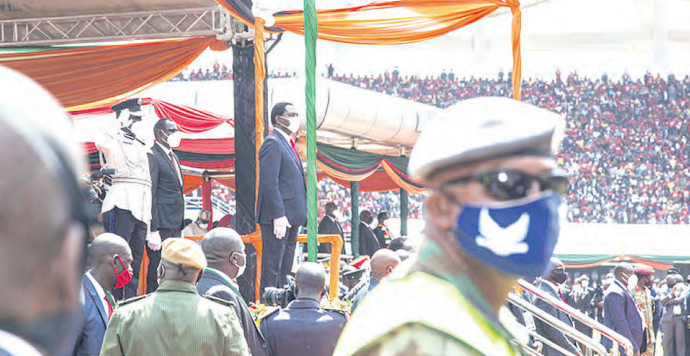
African countries that will not participate in the AUC voting
Because of revolutions and civil war
The 70/30 rule in behavioral psychology states that decision making is 70 per cent based on emotions.
In Summary

The 70/30 rule in behavioral psychology states that decision making is 70 per cent based on emotions which spring from feelings, lived experiences, habits and individual biases. This leaves the remaining 30 per cent as a function of factual evaluation, deliberate reasoning and logical analysis.
With emotions, like fear of the unknown, joys of what is hoped for, anxiety due to unpredictability, confidence of certain outcomes intermingling with external circumstances like social pressures, memories of past events, learned behavior and financial considerations; the voter may very often be unable to make wise decisions.
In the following three true narratives try and predict whether anticipated personal benefit or respect to dignity greatly influenced voters, hence the outcome of the election.
There was once a hotly contested election in a poor rural constituency in Uganda. The competition had crystallised to two dominant candidates after the other contestants realised that their chance had gone from slim to non-existent.
The incumbent seeking a third term was known to have grown fabulously rich despite this clearly grossly underdeveloped community as yet to see any noteworthy improvement in education, health, infrastructure nor employment opportunities during his tenure.
His competitor, an experienced and articulate man, knowledgeable in government procedures, traversed the constituency decrying the increase in poverty and the decrease of social facilities per person within the community, laying blame firmly on poor representation by the incumbent.
Unable to concoct a rebuttal to deflate his competitor’s campaign, the wealthy incumbent on the eve of polling day, and knowing how impoverished his electorate were, he drove 50 heads of cattle from all the corners of his elective boundary to his compound, inviting all to a victory celebration after polling.
Election Results: The incumbent retained his seat. The second narrative took place in Zambia where an incumbent politician’s shrinking support base resulted in him trailing a newcomer whose sole campaign message anchored on unfulfilled promises was gaining traction.
Despite strenuous efforts to explain himself in well-mobilised rallies, there was no discernible change in the prevailing mood among the voters.
The incumbent, who had a great capacity to mobilise resources, then decided to counter his competitor’s strategy by doing the very thing he was accused of not having done. He embarked on upgrading two stretches of road simultaneously by first grading, then compacting.
To give an all weather capability to the road he spread gravel over about half a kilometre of the steeper parts, which were known to be troublesome during the rains.
These works he undertook a few days to the election, with a planned inspection of the works to coincide with a major campaign rally thereafter.
Come the morning of inspection, which was a day after spreading of gravel, to the politician’s utter surprise, the gravel had been harvested overnight for sale in a nearby construction site, while some found domestic use within the adjacent homesteads.
Election Results: The incumbent lost his seat. The last narrative happened in West Africa where a flamboyant businessman and new entrant to politics embarked on a campaign trail opting for grand events as most of his competitors were engaging in meet-the-people entourages – driving from township to township.
He incorporated a helicopter as his preferred mode of transport so as to sensationalise his events and his entry. It also reduced the possibility of being ambushed by the incumbent whose violence was well documented but hardly ever prosecuted.
To ensure a big attendance, which would indicate to his competitors his greater popularity, the helicopter to the grand rally had a banner promising goodies even as it dropped bundles of cash from on high.
Unfortunately the rally was very poorly attended with the vast majority of the electorate having rushed to nearby sugarcane farms where a strong gust of wind and the helicopter’s rotor blades had blown all the money.
Election Results: The flamboyant aspirant was not successful. The aggregated outcome of the three narratives may suggest that personal gain may not necessarily have the desired result if the electorate feels their dignity is not adequately considered.
FATMA BARAYAN, The writer is a
lawyer.

Because of revolutions and civil war